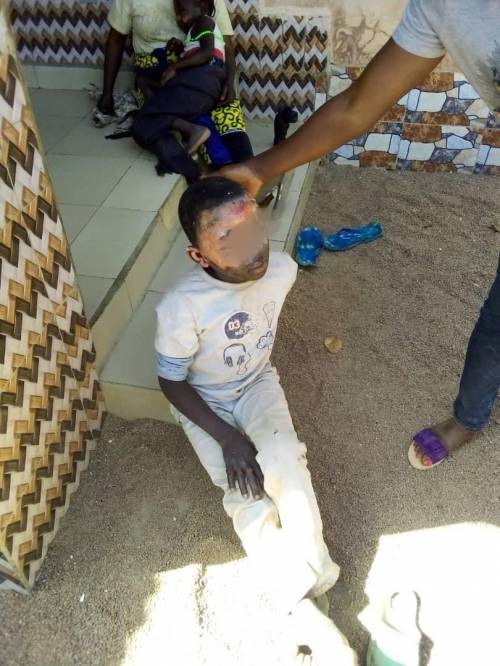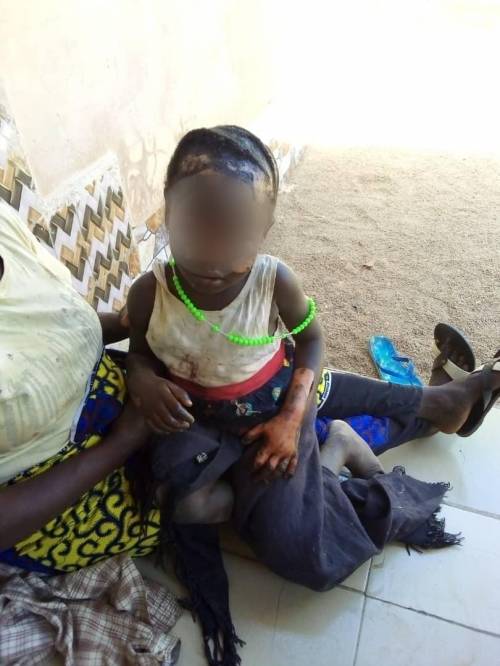
Children Burnt For Witchcraft In Central Nigeria
Posted by Samuel on Wed 12th Aug, 2020 - tori.ng
One of the victims
Some months ago, some national dailies reported the case of two children who were accused of witchcraft and subsequently set ablaze in Plateau State in central Nigeria.
The incident happened in December 2019. Images of the two children with various degrees of burns and bandages on their hands and heads outraged members of the public. After reading the story, I contacted police officials in Jos, and they confirmed the incident. They stated that the matter was under investigation. I tried reaching the relatives of the victims through various channels. I contacted former colleagues at the University of Jos, and one of them confirmed that the children were treated at the state hospital, but were later discharged. The children returned to their community with the mother. I planned to visit Plateau state to interact with the victims and their families and better understand what transpired on that fateful day, including the nature and patterns of witchcraft allegations in Plateau State. Allegations of child witchcraft have been linked to states and communities in Southern Nigeria, especially Akwa Ibom and Cross River states. Not much is heard about child witch allegations elsewhere in the country. I wanted to understand if the incident was part of a pervasive phenomenon that has largely been ignored or new development in the region.
I wanted to understand the different actors in the field of Plateau witchcraft and how to work with them in tackling this vicious phenomenon. My local contacts told me that the affected community was not in Jos metropolis. They pointed out that there were security challenges in the area. In March, the outbreak of COVID-19 led to a lockdown and restriction of movements, including interstate transportation. So I decided to work with local contacts in the state to support these child victims until the time that I could visit and meet with them in person. Through the contacts, I got the phone number of a human right lawyer handling the case, and she promised to link me up with the families of victims. Due to the COVID-19 restrictions, she was unable to make the connections for some months. However, in July, she sent me the phone numbers of the relatives of the children. I spoke to one of the relatives, Mrs Tina, and she recounted the tragic incident to me once more. According to Mrs Tina, a family member fell ill and was taken to a private hospital in the area. But he was not responding to treatment.
At a point, the sick person claimed that a boy in the family was responsible for the ailment; that the boy wanted to kill him. And one day, another relative came to the family house and took the boy to the hospital. This relative asked the seven-year old boy to undo what he had allegedly done, to untie the man so that he could recover from the ailment. But the boy denied knowing anything about the ailment and the allegation. But this relative was not satisfied. Later, he took the boy and a girl from the same family to another old woman who was also being suspected. They brought a Christian evangelist who came with some fuel in a small gallon. The evangelist threatened to set the children ablaze if they did not confess. The children repeatedly denied the allegations and started crying. According to Mrs. Tina, somebody from the crowd snatched the gallon of fuel from the evangelist and poured it on the two children. Another person with a box of matches set them ablaze. The children were screaming and struggling to run away, but some people were pushing them back into the fire.

Another woman came and used some sand to put off the fire but by this time the children had been seriously burnt on their faces and hands. Other children at the scene ran to inform the mother of the children who came and took the children home. Mrs. Tina said that she got a call from the mother of the children who informed her about the incident. On getting to her house, Mrs. Tina found out that the children sustained serious injuries and needed immediate medical attention. She advised the mother to report the matter to the police. But the mother refused. She has been under intense pressure not to report to the police.
They took the children to a local hospital but the hospital staff refused to treat them without a police report. They eventually reported the case to the police, and a policewoman accompanied them to the hospital, and the children were subsequently admitted. The children stayed at the state specialist hospital for two weeks before they were discharged. I was told that the police went to the community to arrest the suspects but the people stoned them, and they withdrew and went back to the station. In February, the police invited the head of the community to their office, and they arrested and detained him for two days. While in detention, he provided the names of the suspects who were arrested and then charged to court. I have reliably gathered that the family of the victims has been under pressure from the defendants to withdraw the case so that they could settle out of court. It is important that the court sends a strong message to those who perpetrated this heinous abuse. There have been similar cases of witch burning across the country. And perpetrators are seldom arrested or punished. For instance, in Cross River state, the police have yet to arrest Thomas Obi Tawo (aka General Iron) and those who burnt 15 suspected witches in Boki in May.
According to Mrs. Tina, witchcraft allegations are common in Plateau state. The belief in occult harm is pervasive in rural communities. People use witchcraft and magic to make sense of their existential challenges. She said that people did not believe that misfortunes such as death and sickness occur naturally; they habitually suspect that somebody must be responsible for these unfortunate experiences. Mrs. Tina noted that there was a need for intense public enlightenment in the communities to reason people out of these mistaken beliefs and harmful practices. The Advocacy for Alleged Witches will explore the possibility of sending advocates to the community to meet and interact with the leaders whenever the security situation in the area improves. AFAW will work with the family of the victims to support and rehabilitate the children and make them less vulnerable to allegations of witchcraft and the practice of witch persecution. The support program will focus on two areas- medical treatment and education. AFAW will help defray the costs of the medical treatment and support the education of the children. There is an urgent need for a national action plan against witch persecution in Nigeria.
***
Written by Leo Igwe


















































